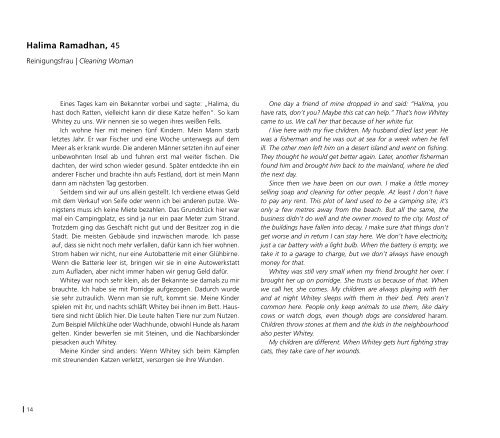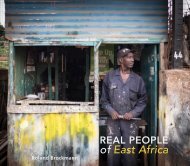Real People of East Africa. Roland Brockmann
From 2016 - 2017 I made four trips through Kenya and Tanzania - travelling over land by minibus, motorbike taxi or on foot. Not to search for something, but to meet the existing, was a great adventure. This photo & text book is about the people I met along my way. They talk about what concerns them: success, failure, love, hope... everyday life. The photos show the people in their living or working environment. And always at eye level. Comming out in december at Photo Edition Berlin. With Essays from Alexis Malefakis and Meja Mwangi. Hardcover. 24 x 21 cm, 112 Pages, 49 images. Language: German/English.
From 2016 - 2017 I made four trips through Kenya and Tanzania - travelling over land by minibus, motorbike taxi or on foot. Not to search for something, but to meet the existing, was a great adventure. This photo & text book is about the people I met along my way. They talk about what concerns them: success, failure, love, hope... everyday life. The photos show the people in their living or working environment. And always at eye level. Comming out in december at Photo Edition Berlin. With Essays from Alexis Malefakis and Meja Mwangi. Hardcover. 24 x 21 cm, 112 Pages, 49 images. Language: German/English.
Create successful ePaper yourself
Turn your PDF publications into a flip-book with our unique Google optimized e-Paper software.
Halima Ramadhan, 45<br />
Reinigungsfrau | Cleaning Woman<br />
Eines Tages kam ein Bekannter vorbei und sagte: „Halima, du<br />
hast doch Ratten, vielleicht kann dir diese Katze helfen“. So kam<br />
Whitey zu uns. Wir nennen sie so wegen ihres weißen Fells.<br />
Ich wohne hier mit meinen fünf Kindern. Mein Mann starb<br />
letztes Jahr. Er war Fischer und eine Woche unterwegs auf dem<br />
Meer als er krank wurde. Die anderen Männer setzten ihn auf einer<br />
unbewohnten Insel ab und fuhren erst mal weiter fischen. Die<br />
dachten, der wird schon wieder gesund. Später entdeckte ihn ein<br />
anderer Fischer und brachte ihn aufs Festland, dort ist mein Mann<br />
dann am nächsten Tag gestorben.<br />
Seitdem sind wir auf uns allein gestellt. Ich verdiene etwas Geld<br />
mit dem Verkauf von Seife oder wenn ich bei anderen putze. Wenigstens<br />
muss ich keine Miete bezahlen. Das Grundstück hier war<br />
mal ein Campingplatz, es sind ja nur ein paar Meter zum Strand.<br />
Trotzdem ging das Geschäft nicht gut und der Besitzer zog in die<br />
Stadt. Die meisten Gebäude sind inzwischen marode. Ich passe<br />
auf, dass sie nicht noch mehr verfallen, dafür kann ich hier wohnen.<br />
Strom haben wir nicht, nur eine Autobatterie mit einer Glühbirne.<br />
Wenn die Batterie leer ist, bringen wir sie in eine Autowerkstatt<br />
zum Aufladen, aber nicht immer haben wir genug Geld dafür.<br />
Whitey war noch sehr klein, als der Bekannte sie damals zu mir<br />
brauchte. Ich habe sie mit Porridge aufgezogen. Dadurch wurde<br />
sie sehr zutraulich. Wenn man sie ruft, kommt sie. Meine Kinder<br />
spielen mit ihr, und nachts schläft Whitey bei ihnen im Bett. Haustiere<br />
sind nicht üblich hier. Die Leute halten Tiere nur zum Nutzen.<br />
Zum Beispiel Milchkühe oder Wachhunde, obwohl Hunde als haram<br />
gelten. Kinder bewerfen sie mit Steinen, und die Nachbarskinder<br />
piesacken auch Whitey.<br />
Meine Kinder sind anders: Wenn Whitey sich beim Kämpfen<br />
mit streunenden Katzen verletzt, versorgen sie ihre Wunden.<br />
One day a friend <strong>of</strong> mine dropped in and said: “Halima, you<br />
have rats, don’t you? Maybe this cat can help.” That’s how Whitey<br />
came to us. We call her that because <strong>of</strong> her white fur.<br />
I live here with my five children. My husband died last year. He<br />
was a fisherman and he was out at sea for a week when he fell<br />
ill. The other men left him on a desert island and went on fishing.<br />
They thought he would get better again. Later, another fisherman<br />
found him and brought him back to the mainland, where he died<br />
the next day.<br />
Since then we have been on our own. I make a little money<br />
selling soap and cleaning for other people. At least I don’t have<br />
to pay any rent. This plot <strong>of</strong> land used to be a camping site; it’s<br />
only a few metres away from the beach. But all the same, the<br />
business didn’t do well and the owner moved to the city. Most <strong>of</strong><br />
the buildings have fallen into decay. I make sure that things don’t<br />
get worse and in return I can stay here. We don’t have electricity,<br />
just a car battery with a light bulb. When the battery is empty, we<br />
take it to a garage to charge, but we don’t always have enough<br />
money for that.<br />
Whitey was still very small when my friend brought her over. I<br />
brought her up on porridge. She trusts us because <strong>of</strong> that. When<br />
we call her, she comes. My children are always playing with her<br />
and at night Whitey sleeps with them in their bed. Pets aren’t<br />
common here. <strong>People</strong> only keep animals to use them, like dairy<br />
cows or watch dogs, even though dogs are considered haram.<br />
Children throw stones at them and the kids in the neighbourhood<br />
also pester Whitey.<br />
My children are different. When Whitey gets hurt fighting stray<br />
cats, they take care <strong>of</strong> her wounds.<br />
14




